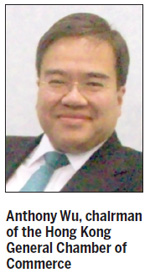Social reform could foster healthy business
Updated: 2010-10-13 07:47
By Joseph Li(HK Edition)
|
|||||||

At the top of Anthony Wu's wish list for what might emerge from today's Policy Address are policy measures to enhance the business environment in Hong Kong.
The Chairman of the Hong Kong General Chamber of Commerce also expects Chief Executive Donald Tsang will announce measures to tackle fundamental livelihood issues such as housing prices and the wealth gap to help reduce rising public anger and facilitate social harmony.
Speaking to China Daily exclusively, Wu reckoned Hong Kong is gradually coming out of the woes of the financial tsunami. He is cautiously optimistic about economic prospects and pencils an economic growth of 5 percent for 2010 - not far from the government's forecast.
"Global and local economies remain uncertain. We must be vigilant, knowing the sluggish US and Euro markets will affect our export trade," he cautioned.
Anticipating measures to strengthen Hong Kong's position as a financial hub, Wu said it is essential for Hong Kong to strive to become an offshore renminbi center, integrate further with the Pearl River Delta and play a bigger role in the 12th National Five-Year Plan.
Still there are serious and growing socio-economic problems here at home, such as housing prices and income disparities.

"Property prices are rocketing beyond the affordability of the citizens," he observed. "Young people today are very frustrated because their salaries stay around 10K, not much higher than their pay in the early years after graduation, moving their goal of purchasing homes further out of reach. The reason is that the economy has not expanded over the past years. In the past decades, the economy expanded quickly, so people had greater job opportunities and earned pay raises."
To regulate housing prices, a stable supply of land and flats in the good and bad times is necessary, he said. Also, the government should enforce property prices in line with the usable area of the flats, while "no-frills" flats with no swimming pools or clubhouses should be built to benefit the sandwich class earning between HK$17,000 and $39,000 per month.
Knowing that most people cannot afford the downpayment, the Bauhinia Foundation Research Centre that Wu also chairs recently proposed a shared ownership scheme that allows a person to buy 50 percent of a flat and co-own it with a government-designated intermediary before he buys back this 50 percent at the original price.
Wu also called on the government to help the poor, quoting the Hong Kong Council of Social Service study that 1.26 million people are living under the poverty line.
"As transport fares are expensive, the traffic allowance scheme may be expanded to a city-wide scheme," he proposed. "The scheme does not cost much but it encourages people to find work and rely on themselves."
Talking about the so-called anti-wealth or anti-business sentiments looming in society, he said the business community has been contributing a great deal to society and the Chamber has been advocating corporate social responsibility. "The matter is exaggerated. Perhaps people are against the property developers or just one or two developers," he mused.
China Daily
(HK Edition 10/13/2010 page1)